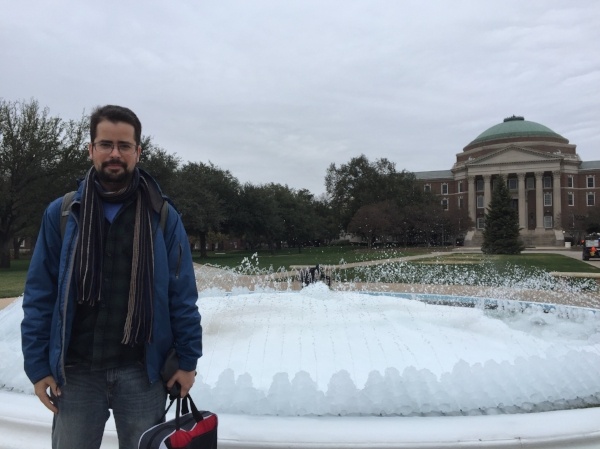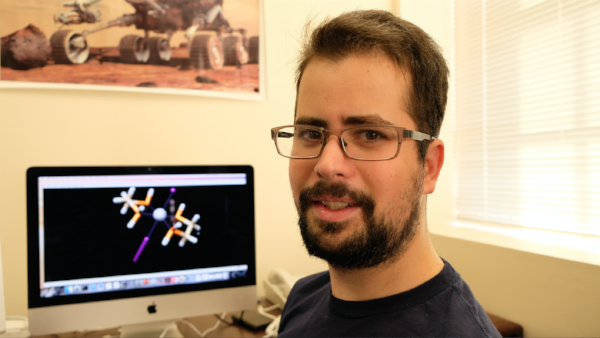
Are you interested in a PhD in Chemistry, but unsure what to expect? It can be difficult to tell what a program is like when you are first looking around, and a website description can only give you so much information.
What is life really like in PhD program focused on intensive chemistry research? We spoke with the very first graduate of SMU’s Theoretical and Computational Chemistry Ph.D. program, Vytor Oliviera, to find out how he made his decision to study TCC and what his time in graduate school has looked like.
Where are you from and what initially got you interested in Chemistry as a field of study?
I am from Brasília, the capital of Brazil. Before coming to SMU to pursue my Ph.D. degree, I earned a Bachelor’s of Science degree in Chemistry (2007-2011) and a Master’s of Science degree in Physical Chemistry (2011-2013). Both degrees are from Universidade de Brasília (UnB), which is a prestigious university in Brazil. I chose chemistry because it was my favorite subject in high school. One thing that always amused me about chemistry is the huge number of possible ways to combine atoms and molecules to obtain compounds with different properties and the possibility to predict the outcome of these combinations using simple models.
How did you hear about the TCC Ph.D program at SMU? Why did you chose SMU?
During the second year of my master’s, I attended a workshop given by Dr. Cremer and Dr. Kraka at the Symposium of Molecular Structure and Molecular Dynamic (SeedMol) in Pirenopolis, a city close to my hometown. The event was organized by Dr. Lopes, a physical chemistry professor from UnB. I was completely fascinated by the innovative way to describe a chemical reaction presented by Dr. Kraka and Dr. Cremer. One day after the Symposium, we met at UnB and I had the opportunity to lunch with them. They told me a little bit about Texas, about Dallas, about SMU and about the research done by the Computational and Theoretical Group (CATCO). A few months later, I sent an email to Dr. Kraka telling her that I wanted to join the CATCO. One year later, in January of 2014, I was here at SMU beginning my Ph.D. studies.
The specific features that attracted me to pursue a Ph.D. in SMU were:
- The innovative research being done at SMU,
- The outstanding curriculum of the computational chemistry program,
- The high-performance computer freely available for research and educational use.
I started my Ph.D. degree in the “old” physical chemistry curriculum. But, a few months after I started, Dr. Cremer told me that he and Dr. Kraka were planning to create a Ph.D. program focused specifically on computational chemistry. What made me decide to move from the old physical chemistry program into the new theoretical and computational chemistry (TCC) program was that the later is a unique program with state-of-art classes specifically designed to train computational chemists.

Now that you’ve experienced the program, what do you most appreciate about it?
In my opinion the greatest advantage of the new curriculum is that it gave more autonomy for the professors of the theoretical and computational chemistry area to shape the educational program according to the interests and abilities of their students.
What types of research have you done over the course of your years of study?
My favorite research topic and the one that I devoted most time to was halogen bonds. Similar to hydrogen bonds, halogen bonds are non-covalent interactions with applications in a myriad of different fields such as drug design, crystal engineering, and supramolecular materials. To better understand how to manipulate the strength of the halogen bond we studied more than 200 different complexes. We found that halogen bonds can be stronger than hydrogen bonds and we suggested some new design strategies for halogen bonded polymers yet to be explored by experimentalist.
Besides halogen bonds we also investigated 100 chalcogen bonds. A new type of complex involving chalcogen bond was found. We believe this new type of chalcogen bond may lead materials with unique electronic properties.
In one of my latest studies we proposed a more general description for the bonding mechanism of halogen, chalcogen, and pnicogen bonds. We found that their bonding mechanism could vary according to the conformation adopted by the molecular complexes and that this conformational dependent mechanism could also be explored for the design of new materials.
In summary, during my Ph.D. I studied the strength and nature of non-covalent interactions such as halogen, chalcogen and pnicogen bonds using advanced quantum mechanical methods (some of these methods were developed by our group). A total of 17,670 single calculations were performed, which added up to a total CPU-time of approximately 147.8 CPU years (time required to run all calculations sequentially in a single-core CPU). These calculations involved the study of about 685 different molecular systems and were only possible due to SMU supercomputers ManeFrame I and II. During the last four year I published six peer-referee papers and three extra papers are yet to be published.
What are classes in the TCC Ph.D program like?
The educational program of the TCC is completely devoted to computational chemistry. Classes such as medicinal chemistry and polymer chemistry are not mandatory anymore. In the new program we have Computer Assisted Drug Design and a series of elective courses which are more in line with what is required for someone that wants to become a specialist in computational chemistry such as advanced application programming or calculation of molecular properties. Many of the classes have a theoretical and a practical part. The practical part involves computer lab experiments that complement the theoretical classes and prepares us to be able to solve problem that we might have during our research.
What is the community life like in the TCC Ph.D. program and at SMU more generally?
The TCC program is very intensive, it is a 4-year program, where it is expected that the students publish at least 5 publications in peer-refereed journals during this time frame. This is only feasible because we start doing research right in the first semester and we have regular group meetings on Fridays to discusses our weekly achievements and difficulties. Besides that, we have regular private discussions with our research advisor (in my case Dr. Kraka) to talk about long term plans and what need to be improved in research and in classes.
During my Ph.D., I attended the 25th and 26th Austin Symposium on Molecular Structure and Dynamics at Dallas organized by Dr. Cremer and Dr. Kraka, and the 2017 European Summer School in Quantum Chemistry held in Italy. I learned a lot from these event and I also met great researchers.
Besides that, I had the chance to lunch with many prominent Computational Chemistry professors thanks to the Department of Chemistry Seminar Speaker Lunch program. I also participated in the 2015, 2016 and 2017 Research Days organized by SMU, which were a great opportunity to improve my communication skills and to make new contacts.
SMU also provides many possibilities for the Chemistry Ph.D. students to interact with non-chemistry students. The Catholic Center organizes meetings and lunches every week to discuss religious related topics for example. I also had the chance to meet other students from Brazil and to talk about my homeland in the Brazilian and Portuguese Speakers Association (BPSA).
Looking back on your four years of study, what are you most proud of?
I feel proud that I could finish my Ph.D. on time with six word-class publications in such a demanding Ph.D. program. This was only possible due to the high-performance computer provided by SMU and due to the great effort and patience that my mentors, Dr. Cremer, and Dr. Kraka, invested in my education. It was a great honor and privilege to learn from their classes, seminars, and workshops.
What are your career dreams or plans?
For now, my plans are to come back to Brazil to start a post doctorate and to finish all the research projects I started in SMU. My future goal is to become a professor in a distinguished university in Brazil.
Why do you think Theoretical and Computational Chemistry is an important and valuable field to study?
I believe computational chemistry is an invaluable field to study for two reasons. First, it serves as a predictive tool that can assist experimentalists to synthesize new compounds, and to design more efficient chemical processes. Second, computational chemistry deals with the fundamentals properties of atoms and molecules helping us to understand the world we live in. For example, computational simulations can be used to explain the outcome of an unexpected chemical reaction, or the complicated mechanism of biomolecules.
Is there anything else you’d like to add? Any advice or wisdom you would pass along to a prospective student?
I have two pieces of advice for prospective students:
- Four years can pass faster than you imagine. So, try to make the most of the time you have in SMU not only to do research and classes, but also to make contact with other professors and researchers. These contact might help you a lot in your future career and may give you some interesting suggestion for your research.
- Do not aim too high in your first project. Start with a simple project and try to make you first publications as quick as possible. After the first publication you will acquire a lot of research experience and you will feel more confident about your abilities. After that you will be prepared for more challenging projects.



